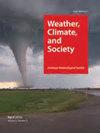气候变化是否对外国直接投资构成金融风险?1970 - 2020年200个国家的实证分析。
IF 1.9
4区 地球科学
Q3 ENVIRONMENTAL STUDIES
引用次数: 2
摘要
本文旨在研究气候变化作为外国投资者金融风险的作用。跨国企业寻求在财务风险最低的地方国际化,包括气候变化对盈利能力和生产力的风险。因此,我们使用1970年至2020年200个国家和时间序列的数据,并使用两类气候变化指标:气候学和气候相关的自然灾害,对气候变化对外国直接投资净流入的影响进行了实证分析。利用FMOLS和RWLS的估计方法,我们得出结论,气候指标(年平均气温和降水量)的上升对外来直接投资产生了负面影响。其次,我们得出结论,大多数与气候相关的自然灾害(沿海/农村/城市洪水、山体滑坡和飓风)阻碍了外国直接投资,而极端高温和野火没有显示出显著影响。此外,研究结果表明,当东道国经济依赖农业活动,与依赖服务业和制造业活动的国家相比,在研发方面没有重大投资,并且更具创新性和对技术基础设施的投资时,气候变化的负面影响更为严重。此外,我们得出的结论是,就人均国内生产总值而言,较贫穷的东道国对外国直接投资的影响比富裕国家更严重。本文章由计算机程序翻译,如有差异,请以英文原文为准。
Does climate change constitute a financial risk to Foreign Direct Investment? An empirical analysis on 200 countries from 1970 to 2020.
The present paper aims to study the role of climate change as a financial risk for foreign investors. Multinational enterprises (MNE) seek to internationalize where financial risk is at the minimum level, including the climate change risk on profitability and productivity. Thereby, we conducted an empirical analysis of the effect of climate change on inward Foreign Direct Investment (FDI) net inflows using data from 200 countries and times series from 1970 to 2020 and employing two categories of climate change indicators: Climatology and climate-related natural hazards. Using the estimation methods of FMOLS and RWLS, we concluded that the rise of climatology indicators (mean annual temperature and precipitations) negatively impacts inward FDI. Secondly, we conclude that most climate-related natural hazards (coastal/rural/urban floods, landslides, and cyclones) deter FDI while extreme heat and wildfires show no significant effect. In addition, the results show that the negative impact of climate change is more severe when the host economy depends on agricultural activities and there is no significant investment in Research & Development compared to countries depending on service and manufacturing activities and are more innovative and invest in technology infrastructure. Furthermore, we conclude that poorer host countries experience more severe effects of climate change on FDI than rich countries in terms of GDP per capita.
求助全文
通过发布文献求助,成功后即可免费获取论文全文。
去求助
来源期刊

Weather Climate and Society
METEOROLOGY & ATMOSPHERIC SCIENCES-
CiteScore
3.40
自引率
13.60%
发文量
95
审稿时长
>12 weeks
期刊介绍:
Weather, Climate, and Society (WCAS) publishes research that encompasses economics, policy analysis, political science, history, and institutional, social, and behavioral scholarship relating to weather and climate, including climate change. Contributions must include original social science research, evidence-based analysis, and relevance to the interactions of weather and climate with society.
 求助内容:
求助内容: 应助结果提醒方式:
应助结果提醒方式:


